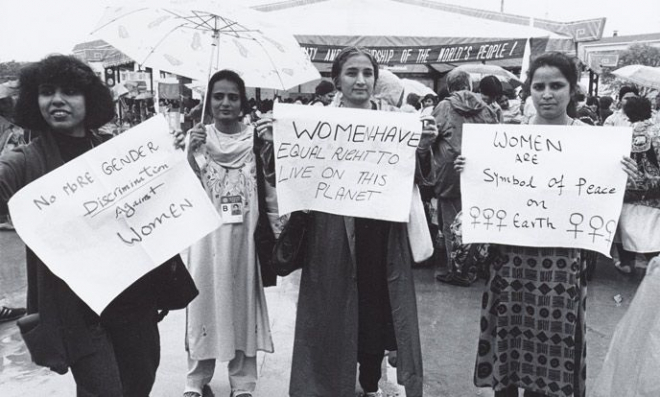This meeting was created in collaboration with Atria and 75inQ to discuss the relationship between climate change and gender (in)equality in the Netherlands, in preparation for the 66th session of the UN Commission on the Status of Women (CSW) that will focus on gender equality in the context of climate change, environment and disaster mitigation in 2022.
Some 50 experts and interested parties gathered physically and online to share their views, knowledge and insights from different angles on this topic. An exciting afternoon with scientists, representatives of NGOs and governments made for interesting discussions. In this blog you can read the most important insights from the meeting.
The issue
Climate change and gender inequality may seem like two different topics with no common ground to most people. However, if you look further, "climate change reinforces, magnifies and emphasizes existing inequalities," according to researcher Mariëlle Feenstra. She shared the initial findings of her research (commissioned by Atria) on gender (un)equality and climate change. Knowledge at the international level shows that women, minorities and marginalized groups bear the greatest burdens and risks when it comes to climate disasters. For example, they have less access to resources so they are hit harder. What about gender (in)equality in the Netherlands when it comes to climate change was discussed at the expert meeting.
First of all, the representation of women in managerial and influential positions in the climate sector is poor, which means they have less access to funding and influence. For example, it was raised that very few women leaders attended COP26. Also, only 26.8% of national climate or environment ministers in the EU are women. Many of the attendees shared the importance of hearing all voices and perspectives in order to have an inclusive, equitable and gender-sensitive climate policy.
In addition, many expressed the need for more knowledge and data on the impact of climate change and climate policy on different groups in the Netherlands. It was discussed that rising energy prices hit women harder than men, because on average they are more often financially dependent and more often live in a poorly insulated rental home. But for many, it is not yet clear what the state of gender inequality is in other climate-related topics in the Netherlands, such as water management, air quality and biodiversity.
The solutions
First, the expert meeting called for more gender-sensitive research into the impact of climate change in the Netherlands, in order to provide appropriate solutions on that basis. More knowledge and data on the differences in the impact on different groups must become the guiding principle for climate policy.
In addition, the importance of cooperation between different organizations and administrative levels emerged. For example, collaborations between women's organizations and environmental organizations, and between relevant ministries and local governments. In this way, knowledge from different perspectives can come together and reinforce each other in a common goal: gender-sensitive climate policy.
A discussion also took place on who bears the responsibility for the climate crisis. After all, this shows who should take care of the solution. Especially structural change and the responsibility in this of the government to include all voices and insights were emphasized. Also, a major system change is needed where there is less commitment to economic growth, because economic growth and care for the environment are difficult to combine.
Individual responsibility and behavioral change were also touched upon as important solutions. However, it was noted that information and knowledge should be better shared. Also, the funding and subsidies that make sustainable choices possible should be accessible to everyone. The government plays a central role in this. The media and role models can also be of great influence. They can set a sustainable example in their messages and raise climate-related issues.
This ties in with the last solution: education and awareness. When a large public has knowledge about the gender-related dimensions within climate issues, more people will also work for gender equality within climate policies.
What can you do?
To bring attention to the issue of gender (in)equality and climate change, we need everyone! During the meeting there are a few good tips shared to take action:
- start the conversation with others
- join a climate movement (look here for an extensive overview)
- and let the gender voice be heard or involve climate in your feminism
This way we can all contribute to an inclusive fight against climate change.
Want to read more?
